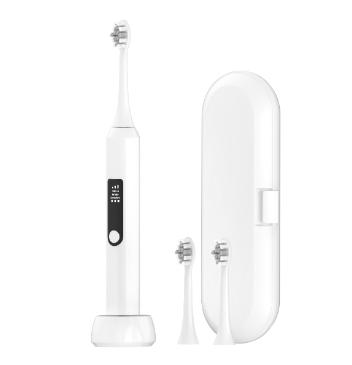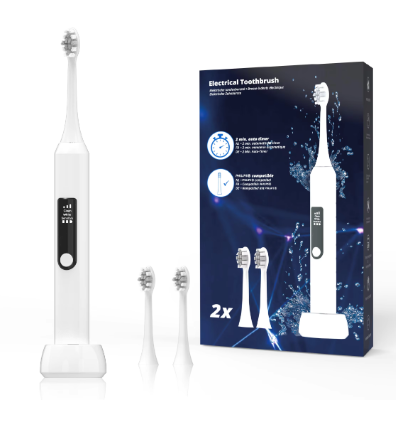Plaque Removal Efficiency: Electric vs Manual Toothbrushes
Scientific Studies on Plaque Reduction
Various trials have found that electric toothbrushes are better at removing plaque than manual ones – by up to 21% in some cases. It has been clearly shown in dental literature by hundreds of studies that oscillating-rotating power toothbrushes perform better than manual brushing in plaque removal. This works to clean more effectively at spots that can be overlooked when brushing manually. In addition, the users of powered toothbrushes are more likely to maintain a stable plaque control (built-in timers, motivation to comply with dental advice). These functions help users brush for an optimal length of time and enhance oral hygiene and reduce plaque.
Manual Brushing Technique Challenges
Hand brush has some downsides which might influence the effectiveness of plaque removal. One of the major problems is hand variability–manual brushing is only as good as the skill and dexterity of the user. A lot of people just don’t practice good ergonomic posture during plaque removal which results in poor plaque removal. Research has revealed deficiencies in both brushing technique and performance, particularly in the removal of plaque in the area along the gum margin. Manual toothbrushes lack the automatic timer and pressure sensor that are found in electric toothbrushes to help users develop good brushing behaviour which highlights the need for individuals to be near perfect with brushing technique in order to not overlook any plaque removal.
Gum Health: Preventing Gingivitis and Damage
Effectiveness Against Gum Disease
The first have demonstrated that electric toothbrushes are better at preventing gum disease, especially gingivitis. Research comparing manual and electric toothbrushes has found evidence of a big decrease of gum inflammation by using an electric toothbrush. We can observe this in direct relationship between the frequent and proper use of electric toothbrushes and better clinical gum health indicators such as lessened bleeding. Dentists largely agree that electric toothbrushes not only remove teeth-staining plaque better but are also great for overall gum health. Other than oscillating head movements and built-in timers, electric toothbrushes can help ensure regular, yet optimal brushing, to keep gum-related issues at check.
Role of Pressure Sensors in Electric Models
Types Of Pressure Sensors One of the main selling points of electric toothbrushes are their pressure sensitive features. These sensors are a vital part of keeping you from brushing too hard, which can cause your gums to recede. Research in dental care has proved that pressure-sensing technology may assist in reducing gum injuries due to brushing by up to 50%. April 23, 3-39 Black pressure sensors to help protect your gums and teeth from excessive brushing April 23, 3-39 Picking up this brush encourages improving oral health with practice, but wearing with a mouthpiece attached Moreover, promote better gums readings! These sensors make automatic toothbrushes there perfect for keeping good gums, letting the user know if they are pressing too hard and therefore losing ideal gum health.
Manual Brushing Risks for Sensitive Gums
People who use traditional toothbrushes often have this issue because constant back-and-forth movements can result in irritating or harming tender gums. There are many people that will use too much pressure when they manually brush, either through lack of knowledge or because they simply do not have proper brush training. Studies show that manual brush users experience more gum sensitivity and pain than those using electric brushes. Dental education is focused on delicate brushing and its correct way to prevent these problem. Manual Brushes Manual brushes can be successful, but require a level of awareness and technique to not cause harm, especially to sensitive gums.
In term of effectiveness for health and safety of brushing, electric toothbrushes, especially toothbrushes with pressure sensors, are beneficial to use as compared to manual toothbrushes especially for the maintenance of gum health. Featuring functions to assist effective brushing, electric toothbrushes are an essential tool in fighting against gum problems and promoting a healthy mouth.
Ease of Use and Brushing Technology
Electric Toothbrush Modes for Personalized Care
Electric toothbrushes also have a variety of modes such as whitening, sensitive, and gum care to deliver you a truly wonderful cleaning experience. These functions are tailored to different requirements, facilitating self-service to achieve the best tooth cleaning effect. For example, one study emphasizes the fact that when the user is able to choose modes that meet their needs, it encourages them to follow brushing recommendations, and improves the quality of their dental life results. And electric toothbrushes also tend to come with user-friendly features such as timers and intelligent tech. Not only do these make brushing more effective, but they also make brushing easier for consumers, resulting in an engaging and effective oral care routine.
Manual Brushing Skill Requirements
On the other hand, it is necessary to have a high level of technical skill to achieve an effective manual brushing, which is usually not possessed by the patients. Hand to mouth : Identity in Malcolm's partially-constituted-who-shows-his-root dissertation, literature Review Archives, Top Suggestions Index Cards, after your work for discussion and their teachers during 20018-000 per year--Continued Help Writing Services. Although manual brushing skills have been increasingly improved in systematic oral education, compliance is difficult, so that the prevention effect on oral cavity does not satisfactorily affirm the function of manual brushing. The problem is that gradient of skill comes with the use of manual brushes, but not with electric brushes which takes the guess work out of brushing technique.
Cost-Effectiveness and Long-Term Maintenance
Upfront and Ongoing Costs Compared
When it comes to analyzing dental instruments such as toothbrushes, it is important to take the initial cost and further expense into account. Power toothbrushes have higher initial costs, typically in the range of $30 - $200 and up, depending on the features provided. These may consist of oscillating technology, timers, and pressure sensors to help improve brushing. On the other hand, not cutting any corners with a more expensive electric brush isn't necessarily a bad thing in the long run if you can cut down on dental problems. Studies demonstrate their effectiveness over typical care means as they are likely to prevent gingivitis and plaque, and thus an excellent investment for mouth health.
Replacement Parts and Sustainability
Refill brush heads are an essential part of a power toothbrush’s hygiene-and- effectiveness.Gentile reminder: Replace your brush head every 3 months, as recommended by the American Dental Association. As a part of sustainability measures, more and more people are encouraged to use rechargeable electric toothbrushes as reusable instead of single-use manual toothbrushes. Eco-friendly and recyclable materials are becoming more prevalent for both manual and electric toothbrushes. This movement is an attempt to reduce our environmental footprint and adopt a more sustainable and sustainable approach to oral hygiene. Adding such criteria can help to make more informed decisions in which the individual's health and environmental consciousness are taken into account.
Dental Professional Recommendations
Ideal Candidates for Electric vs Manual
Dental professionals often recommend electric toothbrushes for specific groups due to the ease of use that they provide.
Electric Toothbrushes: For kids, elderly people and those with special needs. The oscillating and sonic only actions are less aggressive on the teeth and gums and all of this will allow for everyone to enjoy their teeth cleanings without creating more sensitivity issues. Patients who have braces may also be good candidates for electric toothbrushes, since they can help clean around brackets and wires well. The best electric toothbrushes with advanced tech (you know, those ultrasonic options) do an incredible job at breaking up the plaque, making for an all-around better cleaning - especially with braces.
Manual Toothbrushes: Despite the benefits of electric models, manual brushes are suitable for individuals who are skilled in maintaining effective brushing techniques and prefer simplicity in their dental routine. This choice is often based on personal comfort and adeptness at applying the requisite pressure and motion during brushing.

Special Cases: Braces and Sensitivity
Electric toothbrushes can be particularly beneficial for patients dealing with braces or gum sensitivity.
Braces: For individuals with braces, electric toothbrushes offer more precise cleaning around the brackets and wires, significantly reducing the risk of decay. This is crucial for maintaining oral health during orthodontic care when food particles can easily become trapped, increasing the chances of plaque build-up.
Sensitivity: Dental research shows that people with sensitive gums should use electric toothbrushes. These brushes however, can be more gentle to the gums, reduce the pressure on the gums, and they can offer a more balanced pressure level. Additionally, many electric toothbrushes have modes that can change intensity and pressure, which is great for sensitive teeth and gums.
Individualized Care Plans: Dental professionals prioritize personalized care, often incorporating tailored recommendations for brushing devices based on the patient's unique needs. These suggestions may encompass special features or modalities that align with the patient's oral health conditions and lifestyle, ensuring optimal care and comfort.
By understanding these specific recommendations, you can better assess which type of toothbrush aligns with your dental needs, leading to improved oral health outcomes.
Frequently Asked Questions
Are electric toothbrushes worth the extra cost compared to manual ones?
Electric toothbrushes often have a higher upfront cost but are considered a worthwhile investment due to their enhanced cleaning capabilities and ability to reduce plaque build-up, leading to better long-term dental health.
Can electric toothbrushes improve gum health?
Yes, electric toothbrushes are effective in reducing gum disease and inflammation, notably more so than manual toothbrushes, due to their oscillating technology and features like built-in timers.
Is it necessary to have pressure sensors in electric toothbrushes?
Pressure sensors in electric toothbrushes are beneficial as they prevent the application of excessive force during brushing, which can cause gum recession and sensitivity.
Why might someone prefer a manual toothbrush over an electric model?
Individuals might prefer manual toothbrushes due to personal comfort and if they possess the required skill for effective brushing, with simplicity being a primary factor in their dental routine.


